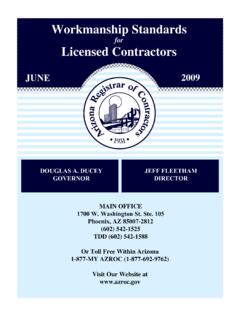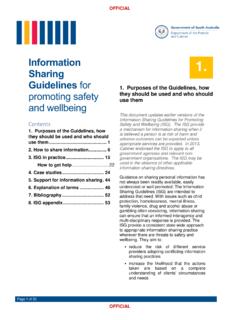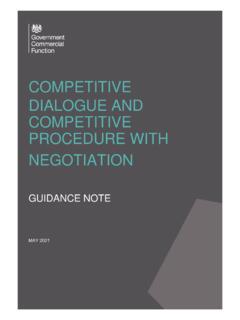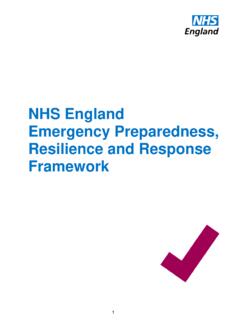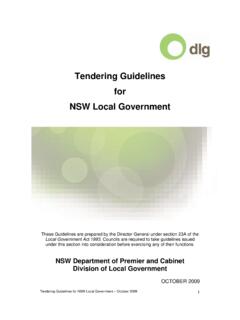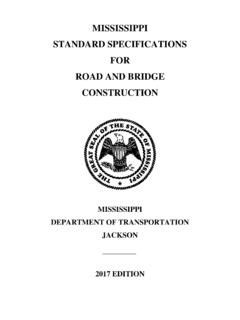Transcription of A Guide to Reserving Below Threshold Procurements - GOV.UK
1 A Guide to Reserving Below Threshold Procurements 1 Introduction This Guide describes what to consider in deciding whether and how to reserve Procurements for Below Threshold contracts. Commercial practitioners at all levels within central government departments, executive agencies and non-departmental public bodies (referred to in this document as In-scope Organisations ) should consider this Guide when seeking to apply the specified reservations. Other contracting authorities may apply the principles outlined in this PPN. However, application of the PPN should be considered in the light of authorities' relevant legal obligations including but not limited to the restriction applicable to local authorities and certain other authorities under Section 17 of the Local Government Act, 1988. This guidance covers options that may be considered by In-scope Organisations when procuring contracts for goods, services and works Below the relevant thresholds.
2 The current thresholds are set out in PPN 06/191 but, in summary, are: Supplies & Services - 122,976 Works - 4,733,252 LTR for certain Services - 663,540 Other contracting authorities should confirm the relevant thresholds applicable to them if they choose to adopt this approach. Reserving Contracts In-scope Organisations should consider, where appropriate, the following options for the procurement of Below Threshold contracts: Reserve the procurement by supplier location - this means being able to run a competition and specify that only suppliers located in a geographical area can bid. This could be UK-wide to support domestic supply chains and promote resilience and capacity, or where appropriate, by county (metropolitan or non-metropolitan, or by borough for London) to tackle economic inequality and support local recruitment, training, skills and investment.
3 In-scope Organisations should not define by nations of the UK ( England, Scotland, Wales, Northern Ireland) and where a county reservation is to be applied, only a single county (or borough for London) may be reserved. Supplier location should be described by reference to where the supplier is based or established and has substantive business operations and not by location of corporate ownership. AND Reserve the procurement for Small and Medium sized Enterprises (SMEs) / Voluntary, Community and Social Enterprises (VCSEs) - this means being able to run a competition and specify that only SMEs and VCSEs can bid. These options should be considered on a case-by-case basis, and can be exercised on their own or together. For example, an In-scope Organisation may wish to reserve a procurement for suppliers based in a particular location (UK-wide, county, borough) and for SMEs and VCSEs.
4 Whichever option(s) is selected, In-scope Organisations should not reserve Procurements for suppliers in England, Scotland, Wales and Northern Ireland. In-scope Organisations may still choose to compete Below Threshold contracts on an open basis without any reservation for supplier type or supplier location where it is considered the 1 2 approach will deliver better value for money, for example because there is a lack of a competitive market. This could include bids from overseas suppliers. In order to ensure value for money, In-scope Organisations should not direct award when Reserving Procurements under this policy. Definitions In-scope Organisations should describe clearly in their procurement notices and documentation which reservations are to be applied, including the standardised definitions of SME / VCSE, and any supplier location restrictions.
5 The following definitions should be used: Small and Medium sized Enterprise (SME): Any business with fewer than 250 employees and either an annual turnover Below 45m or a total balance sheet less than 40m. Voluntary, Community and Social Enterprises (VCSEs): Any organisation (incorporated or not) working with a social purpose. This ranges from small community based groups / schemes, through to larger registered charities and social enterprises, public service mutuals and cooperatives that operate locally, regionally and nationally. This term is often interchangeable with the terms 'third sector' or 'civil society' organisations. Supplier Location: Where the supplier is based or established in a particular location and has substantive business operations in that location. In this context, this means having a registered office, factory or other permanent base in that location from which meaningful business operations have been conducted for at least 12 months.
6 For example, if the reservation is for the UK or a county such as Dorset (non-metropolitan county), this should not preclude foreign suppliers from participating as long as they are based or established and have substantive business operations in the UK in the first example or in Dorset in the second example. Considerations In opting to reserve a procurement by supplier location and / or supplier type, In-scope Organisations will still need to comply with their own internal guidance, governance and procedures. This includes considering a range of additional information to identify and manage risks and ensure value for money, as well as good commercial practices. In-scope Organisations should keep appropriate records of all their commercial decisions. Spot checks on Below Threshold Procurements may be undertaken by the Public Procurement Review Service.
7 Ensuring Value for Money Value for money is a fundamental principle of Managing Public Money 2. It requires cost and quality to be balanced and this can be achieved by securing the best mix of quality and effectiveness for the least outlay over the period of use of the goods or services bought. It is not about minimising upfront prices; value for money is about securing the best whole life cost, demonstrated throughout the contract and beyond. In the context of this policy, value for money will not be achieved by direct award. Competition may be achieved through obtaining written quotes or through a full tender process. 2 3 Consideration should be given to the appropriate method of competition based on a number of factors including transparency, the sector, supply base, value and complexity of the requirement.
8 When opting to reserve a procurement for suppliers located in a specific location, In-scope Organisations should record the rationale / approval of their decision and keep with other procurement documentation. A sample template is provided at Annex A: Reserving by Supplier Location Template. In-scope Organisations may choose to compete Below Threshold contracts on an open basis without any reservation for supplier location or supplier type where it is considered the approach will deliver value for money more effectively, for example because there is a lack of a competitive market. This could include bids from overseas suppliers. Identifying and managing risks The purpose of commercial and reputational risk management is to ensure government contracts are awarded and completed successfully in support of government policy or organisation objectives, taking into account the extent of identified threats and opportunities.
9 Overall risk should be managed within the Organisation s risk appetite and tolerance and in accordance with the Orange Book3. Whilst there are a broad range of risk categories which may apply to specific Procurements , In-scope Organisations should always consider the potential commercial, and fraud and corruption risks when undertaking Below Threshold Procurements . Commercial risks may include: the ability of the market to provide the quantity and quality of services or goods required; interruptions to public services which rely on suppliers; poor performance by suppliers; impact of uncertainties in volume of service or goods provided; and failure of a supplier to meet all or part of their obligations. In-scope Organisations should ensure effective risk management is established in their commercial assurance and governance processes that is proportionate to the value, complexity and criticality of the contract to the Organisation.
10 A proactive approach to identifying and managing risks and opportunities using contracts effectively can drive improvement, innovation and value throughout the commercial lifecycle. The key is to have joined up, transparent mechanisms to identify and handle foreseen and unforeseen risks and opportunities when they arise. For further guidance on risk identification, allocation and management in services and works contracts refer to the Sourcing4 and Construction5 Playbooks. Fraud and corruption risks may include: 3 4 5 4 conflicts of interest, where a relationship exists between a member of the In-scope Organisation and the supplier; disaggregation of contracts, purposely splitting out requirements to avoid above Threshold obligations; gaming the policy, setting up 'phantom' offices to be eligible for geographically defined contracts; and abuse of contract amendments / change orders to increase contract price after award.










